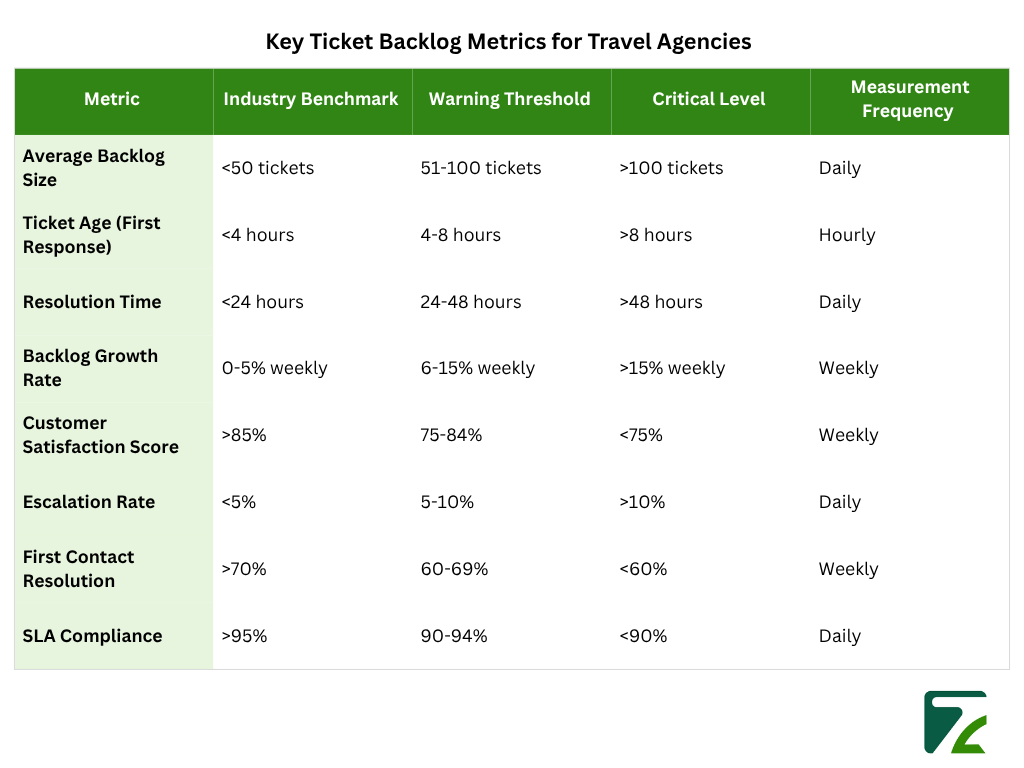In the fast-paced travel industry, in which customer demands are higher than ever before, travel agencies struggle with an issue that can significantly impact their success: ticket backlog. As 86% of the travelers demand an online, end-to-end experience and 60% are willing to switch after one bad or two support experiences, knowing and handling of backlogs in support is your life devising strategy.
Ticket backlog refers to the collection of outstanding customer support requests; a.k.a. tickets that are open for longer than you planned as it would be. For travel companies, this becomes a concrete mathematical formula:
Sum of unresolved tickets open longer than X days = Ticket Backlog
Travel agency ticket backlogs differs from general customer service ones. These outstanding tickets usually relate to time critical support issues like booking confirmations, flight changes, visa documentation issues and last minute travel adjustments. Every ticket left unresolved means not only a technical issue, but also a traveler’s journey hanging in the balance.
Ticket management becomes complicated in a travel industry setting. Imagine a scenario in which a family with young children books a vacation package through your agency. Their confirmation email doesn’t come, leading to a support ticket. Meanwhile, they generate more tickets for seat assignments, transfer details, and activity reservations. IF this initial confirmation issue is challenging for your crew it causes the whole cascading chain of associated requests to fail, leaving your team’s travel experience in tatters long before they’ve even got there.
As support backlogs increase, customer satisfaction falls dramatically. 60% of people consider customer services quality when opting for booking platforms, suggests a research. Every hour that customer travel issues go unresolved causes their frustration to increase exponentially, especially since travel is time sensitive.
Those travel agencies that are faced with the huge backlog of tickets are already seeing several immediate repercussions on customer satisfaction. Response times are ranging in hours or even days, leaving travelers stranded and desperate for help. At the other end of these unqualified responses, those overburdened agents skim through tickets so quickly, with such poor solution details that they only provoke further complaints. More importantly, the SLA breaches are then frequent affecting reputation of the agency and opening its doors for possible compensation claims.
The cost of poor customer satisfaction because tickets are piling up is more than just a short-term problem. Industry research shows that 60% of travelers change suppliers after just one or two bad experiences with customer service. For a mid-size travel agency with 1k bookings per month and an average booking value of $2.5k, losing as little as 10% of their customers due to service failures means losing upwards of $3 million in annual revenue.
In addition to direct revenue hits, agencies experience higher costs of operations. Tackling escalated cases means more Senior-level staff involved, driving up costs by as much as 30-40% per ticket. Compensation and reimbursement for service failures can add 2-3% to total revenue for those agencies that have a chronic backlog problem. Bad reviews online are even worse, particularly when they stem from bad service; those can result in a loss of 22 percent for new customer acquisition, travel studies show.
Travel companies have seasonal spikes that are not hard to predict, but often impossible to keep up with. During the summer vacation (Mar-May) / holiday booking season (Sep-Nov), ticket volumes can increase by 150-200%. These surges create cascading backlogs that remain after peak periods due to the absence of preparation.
Travel being a seasonal industry; agencies are forced to manage staffing costs during downtimes while ensuring there is sufficient coverage at peak times. The reality is that many agencies undershoot the support they need during shoulder periods as travel starts to get planned, and those avoidable backlogs end up cascading into major customer satisfaction nightmares.
Manual booking reconfirmation is one of the biggest factors contributing to high ticket backlogs in travel agencies. According to industry figures, 25% of properties face overbooking challenges in their inaugural year or so of business because booking systems fail to communicate with one another. With these repetitive tasks done manually (to verify each booking, check availability or simply to confirm the exact details for a reservation) across multiple supplier systems, everything involves lots of time.
Manual workflows also raise error rates, resulting in more support tickets. A single itinerary may involve checking between the hotel, carrier, transfer company and activity provider. When something needs manual action, the whole process of confirming a booking freezes and starts to backlog with unhappy customers who do not see their reservation as confirmed yet.
Today’s travel agencies are trying to manage many communication channels like email, phone, chat, social media, and booking platform messages. Without this integration, tickets become splintered across systems and silos, leading to an invisible pileup that only erupts when customers take their complaints to the next level. Research has shown that 35% of travel agencies don’t have a single system for booking tickets, which results in duplicate work and missed client notifications.
The travel industry’s staffing problems are particularly acute and are helping to add ticket backlogs. High levels in employee turnovers (31% per annum average in travel agencies) result in not only continual staff training but also a decrease in team efficiency. New agents take 3-4 months to become productive; ticket resolution suffers during this time.
This is compounded by the complexity of travel products and requires extensive knowledge. Agents need to be up to speed on visa needs, airline policies, hotel cancellation requirements, insurance guidelines and destination-specific restrictions. Inadequate training causes incomplete tickets to be resolved, resulting in more follow-up requests and worsening backlogs.

You need to track and report consistently in order to optimize. Travel agencies must have a dashboard showing real-time backlog metrics, so that they can intervene before customer satisfaction goes down the drain. By monitoring these metrics in a systematic way, patterns can be recognized: perhaps particular booking types or suppliers are generating high numbers of support requests.
It’s appropriate for travel agencies to implement a prioritization system equal to the level of urgency there is as it pertains to people. Create a matrix based on date of departure, booking value, customer loyalty level and issue importance. For instance, change requests for travel within 72 hours should receive the topmost priority, and general questions about future travel can be lined up accordingly.
Set up unambiguous paths of escalation for urgent matters. Create triggers that automatically escalate tickets when they begin to approach critical time periods (for example, check in deadline or payment due date). This is to ensure alerts requiring immediate attention do not get lost in noisy public queues.
For travel agencies, automation offers the best chance to reduce ticket backlogs. AI driven booking can reconfirm bookings automatically for all the suppliers, without agents manually checking. These processes can do confirmation in seconds rather than hours, thereby minimizing tickets generated due to the initial accumulation of confirmation requirements.
Use a chatbot for managing standard questions on status, payment confirmation, and documentation. Research has found that 67% of travel support tickets are in relation to questions that AI can respond to correctly. By siphoning off this type of ticket, humans can then focus on struggle problems that do need a personal element.
You could look at implementing smart ticket routing systems, which would analyze the content of a ticket and assign queries to specialists automatically. For example, visa-related questions are directed to documentation experts while flight change requests are sent to airline liaison specialists. This specific targeting can cut resolution times by as much as 40%.
Sound staffing strategies can cut down ticket backlog without commensurate costs. Adopt flexible scheduling that mirrors agent availability with forecasted ticket volume. By running historical data analysis, trends like Monday morning surges or post-holiday peaks can be identified so that staffing can be adjusted beforehand.
Cross-training programs enable agents to work on tickets of multiple types in peak times. Although experts are indeed important for high level issues, agile agents avoid bottlenecks of excessive load in locked-down subject matter expertise. Build modular training on high ticket volume categories first and then expand agent skills over time.
Think about setting up overflow relationships with niche-focused support travel for your high seasons. These contracts provide the ability to ramp up capacity but avoid hiring & retaining too many full-time staff during downtimes. Make sure the partners are given enough training on your systems and standards in order to keep the service level high.
Prevent your support team from existing in a vacuum by introducing central ticketing systems that cater to every customer interaction. A contemporary travel- specialized CRM system will easily integrate with booking portals, email systems and social media enabling agents to look at a person’s full context. The integration also decreases the amount of time it takes to address tickets because teams don’t have to look in different areas for information.
Introduce automatic ticket generation from booking systems for simpler issues such as a failed payment or changed availability. Getting in front of tickets means agencies can solve issues before customers even catch them, a ticket that never gets to be a complaint and an unflagged happy customer.
Religiously track metrics of improvement so you can confirm the enacted solutions are actually reducing backlogs and making people happier. Track what works by correlating reductions in backlog with change in customer satisfaction scores. Each successive analysis shows which are the most effective technological solutions, process improvements or staffing model changes making the largest difference.
Create accountability through transparent reporting. Share backlog data on and its trends with the whole team, celebrate successes together and work out approaches to tackle problems. This transparency serves to motivate staff and ensures everyone knows their role in helping deliver service quality.
Ticket backlog is more than just a logistical hurdle for travel agencies it’s essential to keeping your customers happy, coming back and growing your business. With 60% of travelers willing to defect from agencies following negative support experiences, efficiently managing support backlogs is a matter of life or death in the travel industry.
Travel industry ticket backlogs pose their own unique challenges seasonal spikes in business, complex multi-supplier bookings and time sensitive issues that require purpose-built solutions, not just generalized customer service strategies. With intelligent prioritization, automation-friendly technologies, well-managed resources, and proven measurement practices in place, travel agencies can turn their support operations from a cost center into a business enabler.
To be successful, you must dedicate yourself to ongoing improvement, invest in the right technology and training. But the payoff is clear: lower customer churn, higher operational efficiency and greater credibility in a business where word of mouth is a major driver of business growth. Travel agencies that understand how to control the backlog maintain stability and client loyalty in a competitive market.
A ticket backlog refers to the number of unresolved customer support requests pending beyond their expected resolution time. In travel agencies, these often include booking confirmations, flight changes, or documentation issues that delay a traveler’s plans.
High backlog leads to slow responses, missed deadlines, and frustrated travelers. When urgent travel issues remain unresolved, customer trust declines, resulting in negative reviews and loss of repeat business.
Common causes include seasonal booking spikes, manual reconfirmation processes, poor system integration, lack of automation, and understaffed or undertrained support teams.
Important metrics include backlog size, ticket age, resolution time, first contact resolution rate, and SLA compliance. Tracking these helps identify bottlenecks early and improve efficiency.
Agencies can cut backlog by automating reconfirmations, using AI chatbots for common queries, prioritizing time-sensitive tickets, integrating communication systems, and scaling staffing during peak seasons.

Travel Automation Expert